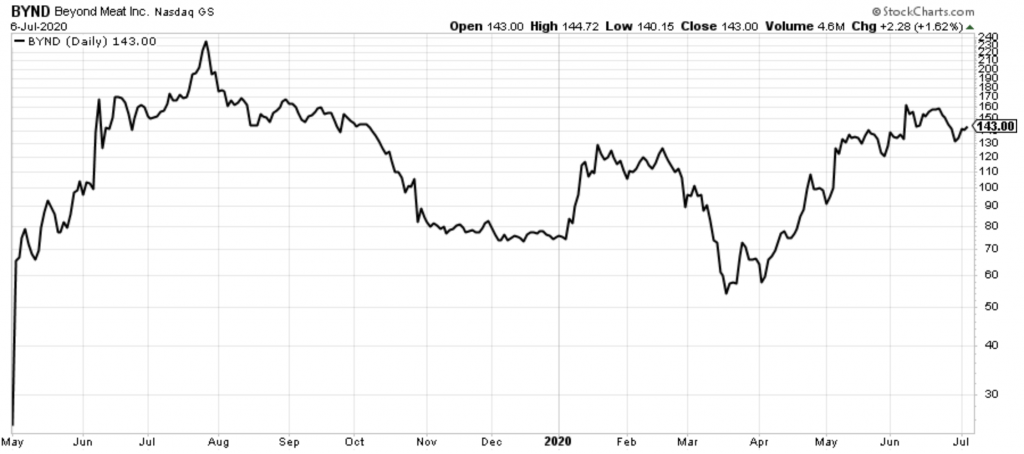If you’ve been to the grocery store recently, you might still be seeing some empty shelves.
Most consumers are still working through their frozen meat and pasta stash, which is allowing stores to catch up, but it’s not the end of the problem.
In early May, 18% of Wendy’s nationwide had listed beef items as out of stock. Wendy’s has always differentiated itself from competitors by using fresh beef. Other chains haven’t been reporting shortages but have admitted that prices are significantly higher.
What you might not know is that there aren’t a lot of players in the meatpacking industry. The three biggest are Seaboard, JBS and Tyson.
JBS and three other food companies control about 85% of beef production.
JBS and Tyson Foods control about 40% of the poultry market. JBS, Seaboard and 2 other companies control nearly 70% of the pork market.
It hasn’t been a good time to be a meet packaging facility. Most have been shut down at least temporarily as employees test positive for Coronavirus. The ones that are open, or have reopened are at a limited capacity in an attempt to protect workers.
But, that’s not the only speed bump facing these companies.
Senators Elizabeth Warren and Cory Booker are opening an investigation of Tyson Foods, JBS, Cargill and Smithfield Foods. There have been multiple reports of unsafe work conditions that have come to light during the pandemic.
This is attached to the proposed Farm System Reform Act. This prohibits new large factory farms from going into business. It would also force others to cease expansions and phase it out by 2040.
Analysts have no doubt that factories will be able to make up for the Coronavirus slow down when they can begin to operate at full capacity again…but it’s becoming more and more uncertain when that will be realistic.
So, while the meat industry is slowing and under scrutiny, it creates more opportunities for meat alternatives to continue its market spread.
A Household Name in Fake Meat
Meat alternatives have been around for years.
Veggie burgers aren’t new and could find fresh tofu or seitan at a local health food store. But there are two names that are working tirelessly to get vegan "meats" into every consumer venues possible.
By now you’ve probably heard of the Impossible Burger and the Beyond Burger, whether you’re interested in consuming them or not.
The market for meat substitutes is expected to hit $2.5 billion by 2023.
Burger King has been pushing advertising for the Impossible Whopper for the last year. And Snoop Dogg has been moonlighting at Dunkin peddling Beyond sausage for the last five months in commercials.

Grab a piece of paper and pen to write this down…
Because you’re about to see the name and ticker symbol of the ONLY 5G STOCK every investor should own.
You can get the name and ticker of this company right here, no strings attached. But you better act fast…
Because the Federal Communications Commission, the government agency in charge of 5G, just scheduled a major announcement that would send shares soaring once announced.
Don't miss out. Click Here to Get #1 5G play for 2020 before the next market close.
They aren’t the only two players in the game, but they are the two that are making their way into the mainstream.
Impossible Foods has no current intention to become public. So, if you want to get into one of these giants, Beyond Meat (NASDAQ: BYND) is your move.
In 2013, Whole Foods gave Beyond Meat its first shot at selling vegan "chicken strips". Since then all new products have been introduced at Whole Foods. Now Beyond Meat can be found in over 58,000 stores, restaurants, hotels, universities and beyond.
Publix, Kroger, Sam’s Club, TGIFridays, Hardee’s, Subway, Denny’s, Del Taco…. the list continues. And it’s not limiting itself to the U.S.
Beyond Meat announced last week that it will be making its retail-store debut in China through a partnership with Alibaba Group Holding. As of this past weekend, the plant-based meat was available in 50 Freshippo stores in Shanghai. That comes after a partnership with the French supermarket giant earlier this year that put Beyond Burger in 500 supermarket locations around the country.
Since the company went public in April 2019, share prices have traded as high as $235 and as low as $55.

It’s currently trading at 22 times sales. It’s not trading like a consumer staple at all. Instead, it’s trading like a tech stock.
Most food products don’t see revenue growth in the triple digits as Beyond has since 2017.
Although it’s not too realistic for a fourth year of triple-digit revenue growth, it could hit 55% and reach positive earnings per share in 2020.
However, this is a fade and the bubble is starting to deflate.
Most companies that announced a partnership with Beyond Meat used it for free press and haven't renewed.
That’s because it’s a novelty and once someone tries it, they go back to eating meat.
Fake meat may appeal to 1% of the U.S. population, but adding artificial meat to a portfolio is dead money.
To your prosperity,
Joshua M. Belanger
Executive Publisher & Founder